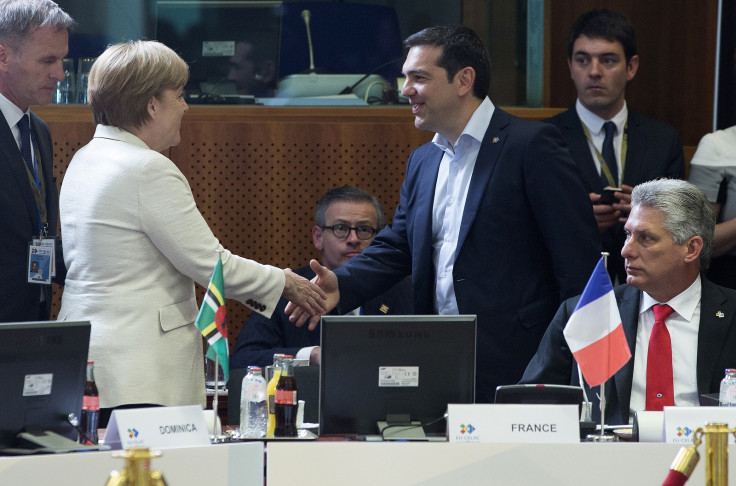Greece-EU crisis: Athens on the brink of Grexit as eurozone toughens stance on cash-for-reform

Greece has moved a step closer to the euro exit door after the European Commission, Germany, Finland and Austria snubbed Athens's cash-for-reform proposals.
Greek Prime Minister Alexis Tsipras travelled to Brussels on 10 May in a bid to hold last minute face-to-face talks with Angela Merkel and François Hollande before a weekend deadline to find a deal to prevent Greece from going bankrupt.
The EU leaders had gathered in the Belgian capital for the EU-CELAC Latin America summit, where commercial and trade ties between the two blocs were discussed.
After a two-hour meeting, Tsipras and a German government spokesman said the talks were "constructive" and said that negotiations to find agreement would intensify — similar language used after several previous meetings.
For this final push, the Commission is of the view that the ball is now clearly in the court of the Greek government which needs to follow up on the agreement at the meeting with president Juncker last Wednesday night
"I think the EU leadership realises they must agree to a viable solution and a possibility for Greece to return to social cohesion with security and growth and also with a sustainable debt level," Tsipras told reporters as he left the meeting. "This will not only give security to Greece, but Europe as well."
Merkel and Hollande left without commenting.
European Commission president and former Tsipras ally Jean-Claude Juncker has also told the Greek Prime Minister that he will not meet him.
"For this final push, the Commission is of the view that the ball is now clearly in the court of the Greek government which needs to follow up on the agreement at the meeting with president Juncker last Wednesday night," a commission spokesman said.
Juncker has accused Tsipras of reneging on a previous commitment to meet fiscal targets, as demanded by the EU and International Monetary Fund, as well as refusing to make sweeping pension reforms and raise VAT.
Greece is seeking €7.2bn (£5.25bn, $8.15bn) in additional loans, and has asked the eurozone to use its bailout fund to repay an additional €6.7bn of debts owed to the European Central Bank that fall due in July and August.
Athens also decided to delay the repayment of €300m to the IMF until the end of June 2015 and include it with a €1.6bn repayment.
Time for Greece to put up or shut up
Eurozone finance ministers believe the time has come for the Greeks to agree a deal or leave the euro – a Grexit, and that Tsipras's comments that the creditors' demands were "absurd" were the last straw.
Wolfgang Schäuble, Germany's all-powerful finance minister, described the talks with Greece as "hard work", adding: "The ball is in Greece's court."
"I believe that the institutions and creditors have made so many concessions to the Greeks that I cannot imagine that there can be further concessions," said Hans Jörg Schelling, Austria's finance minister.
Alexander Stubb, his Finnish counterpart, said: "We will do everything to keep Greece in the eurozone but our patience is running out."
Tsipras warned on 10 June of dire consequences for the eurozone unless a deal was found. "It would be the beginning of the end of the eurozone," he told Italy's Corriere della Sera newspaper. "If Greece fails, the markets will immediately go to look for the next one. If negotiations fail, the cost for European taxpayers would be enormous."
© Copyright IBTimes 2025. All rights reserved.





















